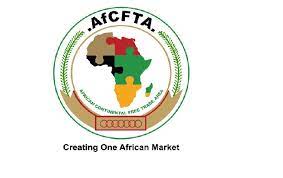The National Action Committee (NAC) on African Continental Free Trade Area (AfCFTA), says it has developed eight strategic pillars in line with the African Union’s framework for boosting trade in the region.
Francis Anatogu, secretary of NAC, said the strategic pillars were developed to achieve the African Continental Free Trade Area (AfCFTA) objectives.
He said some of the pillars focus on establishing the institutional framework to coordinate the multiple agencies in the public and private sectors involved in implementing provisions of the AfCFTA agreement.
According to him, the strategies will grow production for export capacity to $50 billion annually.

Anatogu said this was being done by focusing on selected priority product value chains and on growing a highly productive workforce to earn premium wages in Nigeria and Africa.
“On this pillar, our priority is to fulfil all national requirements to enable Nigerian businesses to commence trading under AfCFTA once the necessary legal documentation becomes available from the AfCFTA secretariat,” he said.
“So far, Nigeria Customs Service has been designated as Nigeria’s competent authority for the administration of the rules of origin.
“With that, efforts are now underway to finalise the import and export processes, procedures, and forms for the administration of AfCFTA rules of origin and gazetting of the legal documents to enable trade to commence.
“We have identified our arrowhead, high potential, and frontier products and services for AfCFTA, considering Africa’s demand and our industrial policies set out in the national development plan, national industrial policy, zero oil plan, and other sector policies.”
Anatogu said the AfCFTA, with a focus on trade of value-added products and services, presents huge possibilities for state governments to grow their economies by attracting and supporting businesses focused on export trade.
According to him, a sub-national AfCFTA programme is already underway to support states to develop their strategies for intra-African trade.
As a result, he said the NAC secretariat in collaboration with the Nigeria Governors Forum (NGF) organised a three-day sub-national strategy workshop on AfCFTA in November 2021.
“Our charge to the states is to build an ecosystem around a specific product and service value chain to achieve a minimum of $1.2 billion of exports by 2035,” he added.
Further speaking on the pillars, he said the third is trade facilitation, reducing time and cost of trade by simplifying, modernising and harmonising import and export processes and procedures.
It also focuses on the automation of administrative and regulatory compliance processes.
He said while the fourth pillar focused on domesticating the AfCFTA agreement by updating trade and complementary policies, regulations, and laws to align with the provisions of the AfCFTA Agreement and to conform to contemporary practices; the fifth pillar would focus on trade infrastructure including energy, digital, and water and logistics infrastructure to enable intra-Africa trade.
According to him, this is evidence of the existing challenges in the quality of trade and transport infrastructure, ease of arranging competitively priced shipping, timeliness, and ability to track and trace shipments.
He said to achieve efficiency, reducing the time and cost required to move cargo and persons across the various transportation modes was an important enabler of trade competitiveness for Nigeria and, therefore, a critical imperative for logistics and supply chain.
“Considering the magnitude of the infrastructure deficit, innovative mechanisms are required to prepare for AfCFTA. The mechanisms include cluster developments along trade corridors, leveraging eligible customer schemes and off-grid solutions for electricity in industrial zones and renewables for SMEs,” he added.

